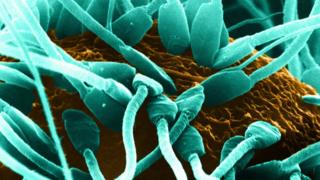JStone
Rookie
- Jun 29, 2011
- 13,374
- 253
- 0
Follow along with the video below to see how to install our site as a web app on your home screen.

Note: This feature currently requires accessing the site using the built-in Safari browser.
The Chinese research took a stem cell, converted it into primitive sperm and fertilised an egg to produce healthy pups. The study, in the Journal Cell Stem Cell, showed they were all healthy and grew up to have offspring of their own. Experts said it was a step towards human therapies. It could ultimately help boys whose fertility is damaged by cancer treatment, infections such as mumps or those with defects that leave them unable to produce sperm.
Sperm factory
Making sperm in the testes is one of the longest and most complicated processes in the body - taking more than a month from start to finish in most mammals. Now scientists have been able to reproduce the feat in the lab. An embryonic stem cell, which can morph into any other type of tissue, was guided towards becoming sperm with a cocktail of chemicals, hormones and testicular tissue. In order to develop properly the cell must go through a crucial and delicate rearrangement of its DNA - its code of life - called meiosis. Just like a female's egg, sperm must lose half of their chromosomes (bundles of DNA) so that a fertilised egg has a normal amount.

The Chinese research team say they have met the international gold-standard set out for reproducing meiosis in the lab. But they did not create sperm as you would recognise them with a head and a tail for swimming - they were a stage earlier known as spermatids. However, the spermatids have the correct amount of genetic information and were successfully inserted into mouse eggs through IVF. "All the offspring were healthy and fertile," Professor Xiao-Yang Zhao, from the Chinese Academy of Sciences, told the BBC News website. He told the BBC that he hoped the study would offer "inspiration" for similar work with human tissue to "solve the problem of sterility".
However, he said there were "ethical concerns" and "possible risks should be ruled out first". His colleague Professor Jiahao Sha, from Nanjing Medical University, said: "We think that it holds tremendous promise for treating male infertility." Spermatids have been used to create healthy human babies in Japan. But the procedure is illegal in some countries. Another challenge the field needs to overcome is the starting material - no adult has embryonic stem cells. The Chinese group believe converting skin cells into a stem-cell state, which can be done reliably, will be the solution.
Exciting
If the technique pans out in people, doctors might someday be able to turn skin cells from a man into sperm that can pass along his DNA to his offspring. But experts warned that the technology would have to overcome some hurdles first. The mouse work is reported by Chinese scientists in an article released Thursday by the journal Cell Stem Cell. The technique is now being tested in monkeys, a senior author said. Qi Zhou of the Chinese Academy of Sciences in Beijing added in an email that the research has "a long way to go" before it could be used for infertile men.
The scientists began with mouse embryonic stem cells, which are found in embryos and can develop into any kind of cell in the body. In the lab these cells were exposed to chemicals to nudge them toward becoming sperm. While previous research has also generated sperm precursors in this way, these precursors then had to be transplanted into the testicles of mice to develop further. The new technique is an advance, experts said, because it eliminates the need for transplants. Instead, the researchers put the sperm precursors in a lab dish containing testicle cells.

This microscope image provided by Xiao-Yang Zhao of the Southern Medical University in Guangzhou, China on Thursday, Feb. 25, 2016, shows rudimentary mouse sperm derived from stem cells. The sperm, although not fully mature, were developed far enough to fertilize eggs. The researchers' findings were released Thursday by the journal Cell Stem Cell.
Although the precursors never became fully mature sperm, they developed far enough to fertilize eggs. They were injected into 379 eggs; nine baby mice resulted. The results are convincing, said John Schimenti of Cornell University in Ithaca, New York, who didn't participate in the work. He said he thinks the major payoff will come in basic research into sperm development. But he and another expert, Renee Reijo Pera of Montana State University, said they thought the technique might someday be adapted to more directly help some infertile men.
In that case, the process would begin with skin cells or other cells from the patient, which could be converted into stem cells bearing the patient's DNA. These stem cells would then be put through the process. But there would be challenges in applying the mouse technique to people, such as finding an alternative to using testicle cells from newborns, Reijo Pera said. She also said the mouse results would have to be confirmed by other labs first, a standard caveat for research. And given the practical limits on availability of eggs from women, the technique would have to be made more efficient in producing births, she said.
Mouse sperm made in lab; technique may help with infertility